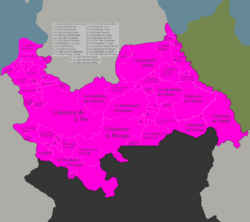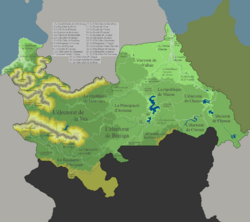La Ves: Difference between revisions
No edit summary |
No edit summary |
||
| Line 28: | Line 28: | ||
|other_symbol_type = <!--Use if a further symbol exists, e.g. hymn--> | |other_symbol_type = <!--Use if a further symbol exists, e.g. hymn--> | ||
|other_symbol = | |other_symbol = | ||
|image_map = | |image_map = | ||
[[File:LaVesMapPlain.png|250px|frameless]] | |||
|loctext = Northern Fusea | |loctext = Northern Fusea | ||
|alt_map = <!--alt text for map--> | |alt_map = <!--alt text for map--> | ||
|map_caption = <!--Caption to place below map--> | |map_caption = <!--Caption to place below map--> | ||
|image_map2 = | |image_map2 = | ||
[[File:LaVesMapTopoPol.png|250px|frameless]] | |||
|alt_map2 = <!--alt text for second map--> | |alt_map2 = <!--alt text for second map--> | ||
|map_caption2 = <!--Caption to place below second map--> | |map_caption2 = <!--Caption to place below second map--> | ||
Latest revision as of 16:29, 16 May 2024
The Vesite Republic La Republique de la Ves | |||||||||||||||||||||||||||||||||||||||||||||||||||||||||||||||||||||||||||||||||||||
|---|---|---|---|---|---|---|---|---|---|---|---|---|---|---|---|---|---|---|---|---|---|---|---|---|---|---|---|---|---|---|---|---|---|---|---|---|---|---|---|---|---|---|---|---|---|---|---|---|---|---|---|---|---|---|---|---|---|---|---|---|---|---|---|---|---|---|---|---|---|---|---|---|---|---|---|---|---|---|---|---|---|---|---|---|---|
| |||||||||||||||||||||||||||||||||||||||||||||||||||||||||||||||||||||||||||||||||||||
La République de la Ves was formed after the many bouts of power outside states tried to control the region and her home city. With the collapse of the Fusean Empire and many others that tried to control it, La Ves managed to seize control over the bountiful lands around her, even pushing outside of the Fusean Empires borders, and seized control of 2 coastal regions. With Vusalla in the east, and Dietger in the south, La Ves has to maintain her standing, and see to her independence and control of her home region.
La République de la Ves is not entirely unified like any other nation, as she is largely a centralized tributary/subjugation system, where La Ves has supreme control over the other states within her external boundaries. Economic and military superiority were used to control the other states, and reduce their power. Every other state within the republic, once warring each other for land, are now forced to live with stagnate borders, and heavily reduced military capabilities as La Ves uses their manpower pool for her own advantage. Not all of these states like this, especially the other 2 Electorships, who are the next most powerful states after La Ves, who also claims the Electorship status herself. Despite their want for independence, or control over the republic, they do not have the military or economic means of doing so, as those were gutted when La Ves took power.
Etymology
The Vesite Republic or “La République de la Ves” in Fusienne Française, derives from the capital and origin of the nation, La Ves. When translating to Common Strangerealic, or any gender neutral language, it is heavily encouraged to keep La Ves’s gender. Instead of it, the official status of pronouns are she, her, and hers. In fact, when in La Ves, it is illegal to refer to her with a gender neutral pronoun.
History
The creation of La Ves is a very difficult thing to truly document, as many cite different times for when she truly formed. The first claim is the formation of the city herself, being built in the year of 843 under the Kingdom of Cassey. This was the time under the dominion of the Fusean Empire, where she saw a prosperous growth. The second claim is that, when the Fusean Empire fell on the October of 1920 , La Ves and many other city states popped up, and experimented with many forms of governance, this lasted until the Peninsular Empire on the 29th of June, 1934, invaded and subjugated the majority of the remains near La Ves, and La Ves herself. And, as all empires eventually collapses, so did the Peninsular Empire, shattering on September 19th, 2023, into many states such as the rump, pretender state of Meliboria, which soon got conquered by the Vusallan invaders, the House of Dietger, and many other fractured states, including La Ves herself. This is the officially recognized time frame of the nation's founding. Unlike the invasion of Meliboria by Vusalla, La Ves took 3 years to formalize its power. Being one of the many states that enjoyed a strong economic and population benefits, La Ves became stronger than her neighbors, allowing her to subjugate the other states. This coincided with the rise of the Dietger dynasty in the south of the empire. Turning her attention west on the 12th of July, 2025, she pushed passed the mountain path and fought a 4 month war against the Alsacé, Creete, and Umbree kingdoms. After wining the war, La Ves split the three kingdoms into pieces, leaving the remains of the 3 royal houses in control angry that they lost a significant portion of their land. Soon thereafter, she looked northeast, towards the northern coast. Looking past the Electorate of Vallais and Kingdom of Mazoa (which fractured a week before with no Vesite interference), the coast was heavily desired by her, along with the border with Meliboria. After a 2 week invasion, she conquered the Pays-Bas states along the coast, and subjected the Confédération des Pays-Bas on the 4th of January, 2026, which soon after, split into 4 states. Then, while making preparations to invade Meliboria, Vusalla conquered it, leaving contentment in her eyes. Fashioning themselves as the Holy Fusean Empire, La Ves refused to acknowledge this, and granted the borderlands to the March of Vusalla and the Theocracy of Vussalla, being named after the nation that borders the two states. The core formation of these two was to ensure fortification and preventative measures from potential invasions from the new pretenders.
Geography
Climate
Environment
Politics and Government
Military
The Armed Forces of La Ves or Les Forces Armées de la Ves is the military of La Ves. It finds its origin on the 24th of January, 1957 as a Vesite resistance force within the Péninsulaire Empire
Foreign Relations
Economy
Energy
Industry
Infrastructure
Transport
Demographics
The many social issues, such as Abortion, LGBTQ, gender equality, and the like, are largely state dependent, with little to none regulation from the federal government. However, some states like L’électorat de La Ves, which currently houses the federal government, have completely legalized these things, or as much as they can.
Population
| Total Populations (Million) | Ethnic Group | Culture | Population % | Population (Million) | (First) Language | Religion |
|---|---|---|---|---|---|---|
| 42.8 (56.9%) | Gens | Gens de Mazoa | 10% | 7.5 | ||
| Gens de la Ves | 11% | 8.3 | ||||
| Gens de Côte Nord | 5.5% | 4.1 | ||||
| Gens de Côte Ouest | 3.1% | 2.3 | ||||
| Gens d’Allaise | 6.4% | 4.8 | ||||
| Gens d’Avignan | 8.4% | 6.3 | ||||
| Gens de Bretiga | 6.9% | 5.2 | ||||
| Gens de Facilistor | 4.9% | 3.7 | ||||
| Gens des Montagnes | 0.8% | 0.6 | ||||
| 18.4 (24.5%) | Folke | Folke de Vallais | 8.9% | 6.7 | ||
| Folke de Mazoa | 6.9% | 5.2 | ||||
| Folke Général | 8.2% | 6.2 | ||||
| Folke d’Alsacé | 0.4% | 0.3 | ||||
| 0.8 (1.1%) | Meliborian | Southern Meliborian | 1.1% | 0.8 | ||
| 2.4 (3.2%) | Fiolsken | Western Fiolsken | 3.2% | 2.4 | ||
| 1.7 (2.2%) | Péninsulaire | Valstovaire | 0.8% | 0.6 | ||
| Umplathaire | 1.5% | 1.1 | ||||
| 8 (10.6%) | Alpinistaire | d’Umbrée | 3.9% | 2.9 | ||
| d’Alsacé | 2.6% | 1.9 | ||||
| de Creete | 4.3% | 3.2 | ||||
| 0.2 (0.3%) | Etranger | Etranger | 0.3% | 0.2 |



